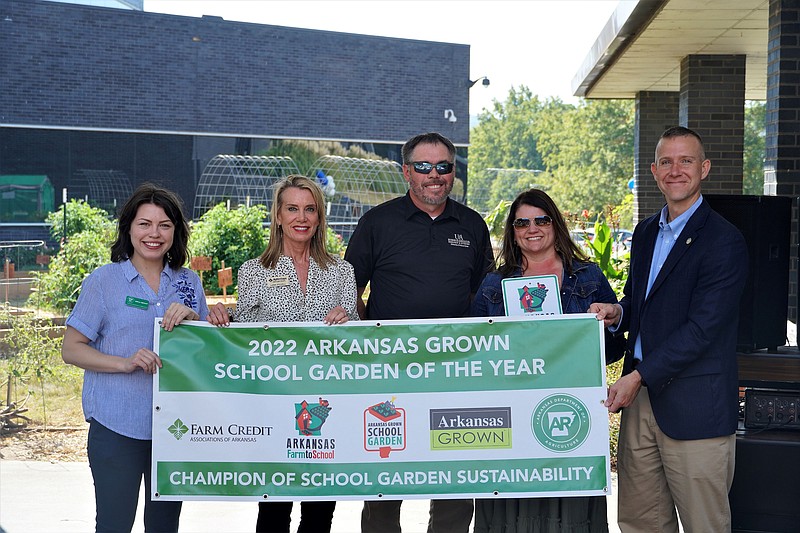School gardens can help bring the classroom outside, and they provide students with opportunities for hands-on learning in many subjects.
Brad McGinley, Grant County Extension staff chair for the University of Arkansas System Division of Agriculture, helped found the school garden program at Sheridan Elementary School, which recently received the Champion of School Garden Sustainability award in the 2022 Arkansas Grown School Garden of the Year Contest.
McGinley said the $1,000 award, which recognizes one school that is a previous category winner and has integrated its garden program into the foundation of the school's culture, shows that "our program has taken it to the next level."
"We're incorporating the garden into the everyday curriculum of the school," he said.
"It's part of the fabric of the school system. That's really important, and it shows their commitment to the program."
McGinley helped establish the school garden at Sheridan Intermediate School in 2017, followed by the garden at Sheridan Elementary School in 2018. For five of the past six years, either the elementary or intermediate has been an award winner in the Arkansas Grown School Garden of the Year contest.
The contest, presented by the Arkansas Department of Agriculture and Farm Credit Associations of Arkansas, recognizes public and private K-12 schools, early childhood education facilities, and alternative learning environments that had a school garden open during the 2021-2022 school year or planned to start a garden in the 2022-2023 school year.
McGinley said Sheridan Elementary School teachers Carla Marsh and Cindy Whitaker "do the bulk of the coordination and work in the garden," using it as an outdoor classroom and encouraging students' involvement.
"That's what it takes to have a successful school garden program," McGinley said. "The teachers themselves and the students have to have buy-in. They have to take ownership of it or it doesn't work well. Cindy and Carla use it as a learning source, and it's not just necessarily about where your food comes from. They try to incorporate different aspects of what they're learning in the classroom and translate that out into the garden."
Whitaker, a first-grade teacher at Sheridan Elementary, said that unless students grow up on a farm, very few realize "where their food comes from and the hard work that it requires."
"To see the fruits of their labor and taste fresh fruits and vegetables is so rewarding for students," she said.
"Many students have never tried fresh lettuce, or fresh strawberries picked right from the plant.
They learn so much about how things grow and change, cause and effect, hard work and contributing to a community."
Marsh, a literacy and math intervention specialist at Sheridan Elementary, said she, Whitaker and McGinley are "just so proud of our students each year and how hard they work to keep the garden going from year to year."
"They get to see the benefits of what we plant each season," she said. "It takes all hands on deck to keep the school garden going."
A GARDEN FOR ALL STUDENTS, IN ALL SEASONS
The Sheridan Elementary School garden sits outside the kindergarten wing of the building and covers about 1,600 square feet. McGinley said the garden's staples include sweet potatoes, which they grow during the summer because "we can plant them in May and they can grow all summer long, with very little maintenance needed when school staff are not there to watch them."
Once those are harvested in the fall, they plant strawberries, which grow until they're ready for harvest in the spring.
During the school year, produce harvested from the garden is used within the school, such as by cafeteria staff or by students in Family and Consumer Science classes at Sheridan High School.
McGinley said produce grown during the summer is usually donated to a local food pantry, including the variety of squash, peppers, tomatoes and zucchini that teachers and students grew last summer.
In addition to the work of McGinley, Whitaker, Marsh and their students, Master Gardeners also help tend the garden.
"The Master Gardeners really provide a resource for us," McGinley said.
"Since it's an elementary school, we're kind of limited, as the students are pretty young, and they can't necessarily get out there and do a lot of the heavy lifting, such as replacing the soil in the beds."
McGinley said that by learning about where their food comes from, students are more adventurous with trying new foods.
"What we've found is that students who grow their own food are more willing to try healthy choices," he said.
"They might not be willing to try salad if they just get it served to them. But if they know that they've grown it, they're a little bit more willing to try it."
These "real world applications" of what students learn at the school garden are an important part of the program, McGinley said.
"In my opinion and our teachers' opinion, kids need to be outside more.
We want to get them outside and get their hands in the dirt, learning it's okay to be outside and get their hands dirty, that it's okay to sweat and put in hard work," he said.
"It teaches life skills beyond learning in the classroom, and that's what's important: taking what they've learned in the classroom and applying it to a real-world situation."
For details about Arkansas Grown, visit arkansasgrown.org.
To learn about extension programs in Arkansas, contact a local Cooperative Extension Service agent or visit www.uaex.uada.edu. Follow the agency on Twitter and Instagram at @AR_Extension.
The University of Arkansas System Division of Agriculture offers all its Extension and Research programs to all eligible persons without discrimination.
Rebekah Hall is with the University of Arkansas System Division of Agriculture.
